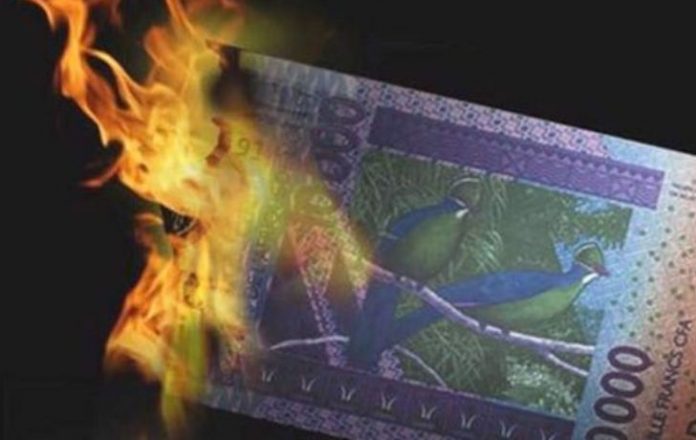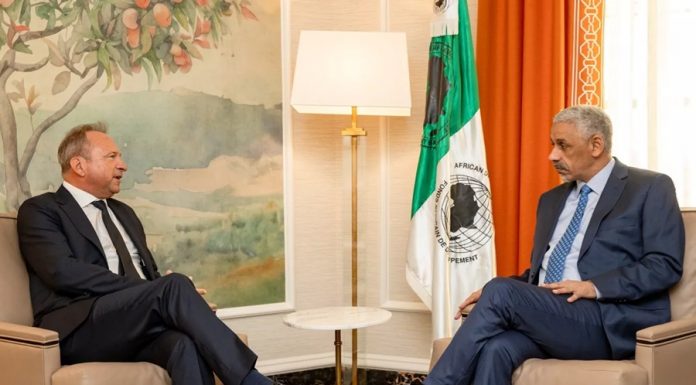[ Publié / Modifié il y a
BETWEEN EXIT IN GROUP AND EXIT BY STATE : FRANC CFA WHICH PERSPECTIVE?
The recent remarks of the Ivorian President Alassane Ouattara about the FCFA during his visit to Elysee have demonstrated the extent of differences of opinion about whether or not the African countries should leave the currency considered as a colonial heritage. By calling the controversy a “false debate”, born of remarks by the vice-president of the Italian council accusing France of being at the origin of the misery of African countries still dependent on the FCFA, the Ivorian head of state is presented as fervent defender of this currency which he qualified before the media of solid and stabilizing.
While economists, politicians and civil society actors in Africa are spreading hostile rhetoric against the FCFA; calling for a joint mobilization for a final exit from this yoke, the position taken by the Ivorian leader poses on the table the issue of the exit style that would be best suited for African states to detach themselves from this monetary repression.
OUTPUT OF THE FCFA: THE PROCESS
Used by 14 countries of the African continent including eight belonging to the UEMOA area (Burkina Faso, Togo, Benin, Senegal, Mali, Ivory Coast, Niger, Guinea Bissau) and five in the CEMAC zone (Central African Republic, Gabon, Chad, Cameroon, Equatorial Guinea), the FCFA has about 155 million users. Although operational in these countries since independence, this currency until today is manufactured in France. It has been pegged to the euro for 20 years through the French Treasury, and its value is defined by the European currency (1 euro = 655.96 CFA francs). In other words, it is convertible only in Euros, hence its dependence on the financial policy of Europe.
To leave, the CFA franc must obey a very specific and defined framework beyond the emotions that the subject arouses through the painful colonial memory to which it refers. If some voices echo a group exit that could be done after a referendum, the other option as proposed by the Senegalese economist Ndongo Samba Sylla, is a completely different pattern which will lead to the break with this currency. According to the Research Officer in the West Africa office of the Rosa-Luxemburg Foundation (Dakar), the divorce between the countries of the franc zone and the CFA franc can be done in 3 stages.
1-Abolish the monetary cooperation agreements with Paris
The priority for African countries being to be able to create their own currency and to have full control of their monetary and exchange rate policy, it is necessary for them to have control over their external reserves. And to get there, one thing is necessary, break the monetary cooperation pacts with the former colonizer as well as the agreements involving the account of operations with Paris.
2- Put an end to the stowage with the euro
Should follow thereafter, the elimination of the stowage of the FCFA to the euro and a change in the statutes of the central banks that are BECEAO and BEAC which will allow the latter once reformed to redefine their policy for better economic growth, financing of public deficits, a facility for the allocation of bank credits and price stability.
3-Creation of a new currency
The third and final step and certainly the most important should be the initiative for the countries of the franc zone once freed to create their own currency. This project could of course lead to the creation of a single, regional or continental currency. But in view of the contradictory opinions that divide African political leaders and economists, the death of the FCFA by a common exit turns out to be a scenario closer to the utopia than reality.
OUT OF THE FCFA: DIVERGENCE OF OPINIONS IN AFRICA
The different duels of arguments African leaders face when it comes to discussing the future of the CFA prove that a group outing of the CFA system would be difficult or impossible. Disagreement is manifested even at the level of heads of state. In West Africa, Ivorian President Alassane Ouattara continues to defend the FCFA he finds strong. In this logic he has the support of his Beninese and Senegalese counterparts who have already pronounced in the past officially on the question of the maintenance or not of their countries in the Franc zone. If the former greets the parity with the European currency, the second argues that the CFA franc is a good currency to keep.
“The CFA franc is stable and is the right currency for us” (Macky Sall, President of Senegal)
“The fact that the CFA franc is in fixed parity with the Euro is not a handicap” (Patrice Talon, Beninese president)
In Central Africa the speech held by the Chadian President contrasts with that of his peers mentioned above. The one who has appeared in recent years as a fierce supporter of the rupture with the neo-colonial currency, in a clear speech indicates that the economic agreements between France and Africa are outdated. Arguing that they are impoverishing the continent, he argues that it is time for the African countries of the Franc Zone to cut “this cord that prevents Africa from taking off”.
“France has been running our economies for 70 years, it must stop” (Idriss Deby Itno, President of the Republic of Chad)
If the presidents contradict each other on the subject, so are the economists. Former Togolese minister Kako Nubukpo, who has never concealed his disenchantment with the currency, claims that it is by no means a mechanism that can allow the fund to start its structural transformation, according to him the FCFA is stifling savings of African. The analyses of this graduate in economics; graduated from the University of Lyon, are contradicted by another economist, his compatriot Michel Nadim Kalife who argues that “the CFA franc is not responsible for the tragedies of Africa. The problem according to the latter would be the weak governance of our republics.
Even at the level of sub-regional organizations, the battle of opinion is raging. Speaking at a round table organized in France under the theme “What monetary and exchange rate policies for sustainable development in low-income countries”, the chairman of the commission of the Central African Economic and Monetary Community (CEMAC) Professor Daniel Ona Ondo has called on France and the financial institutions, the IMF and the World Bank, to make frank and thoughtful consultations with African actors on the subject of the FCFA. For Senegalese Ahmadou Al Aminou, national director of ECOWAS, there is simply no debate because the FCFA is and remains one of the best currencies in Africa.
To leave the CFA system as a group, it would already be necessary for the 14 African states sharing this currency to share the same vision of the prospects to be considered for their economic emancipation. In the current political context where we have on the one hand leaders in favor of a break with the system and on the other side, those who indulge in a posture of imperialist valets, a group departure cannot be possible.
Money is above all a symbol of sovereignty, it would be better for each country in the climate of disunity that prevails on the African political scene to take control of its destiny by focusing on the interests of its people. Seen in this light, leaving this “monetary Nazism” alone to create its own currency would not be a problem in itself.
Article from AFRIC Editorial
















